Terrence Howard Fighting Interview
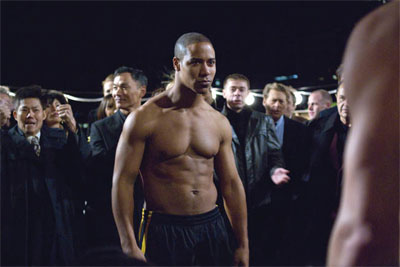
TERRENCE HOWARD FIGHTS FOR WHAT HE BELIEVES IN.
Terrence Howard, Fighting Interview by Paul Fischer.Terrence Howard is one of Hollywood's most interesting and diverse actors. About to be seen in the new action drama Fighting, Terrence Howard was last seen in the blockbuster hit, Iron Man, but has been replaced in the sequel by Don Cheadle, which has been the subject of much conjecture. In this frank interview, Howard talks candidly and philosophically about what happened with Iron Man, his career aspirations and of course his role opposite Channing Tatum in Fighting.
QUESTION: Now, one of your Fighting co-stars referred to you as being a very intense actor. Yet I've met you a few times, and you don't strike me as being as intense as she makes you out to be. I'm just wondering where that comes from, and what it is that drives you as an actor to be as intense as you are?
TERRENCE HOWARD: I ride life, you know, like it's a beautiful go-cart. In real life, you know? Me and my friends, we'll get out there, and we're going to make a go-cart. And you spend so much time finding pieces to make the go-cart. And sometimes it don't work. But then all of a sudden, you've got a go-cart that's working. And right when you start riding down the hill, your mother calls you and tells you gotta come in. The little boy has to stop, right then, in there. And he comes in, and he's angry, and he's sullen in his face. I'm having such a great time in my life right now. I'm making go-carts, you know? And then when they call me and make me come to work, I walk in there, and I slam doors, and I do all those things. You know. That a little bad kid would do.
QUESTION: So, you would describe yourself as a little bad kid?
TERRENCE HOWARD: A little bad kid that doesn't have any Adderall. You know.
QUESTION: Why is acting not your go-cart?
TERRENCE HOWARD: Oh my God, because there's other people telling me where I gotta go. You know? It's not my go-cart any more.
QUESTION: But it could be!
TERRENCE HOWARD: Not when somebody else is writing the check. You're in their field. You know. Like, you've played baseball or basketball at somebody else's house. You know, where they have all the rules of the court, and you've gotta - that's no fun. That's no fun whatsoever, you know?
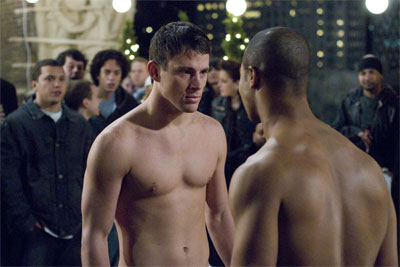 QUESTION: It seemed like the character you play in Fighting could have turned out to be the corrupt A-hole who's in on the scheme, and everything. But he comes across as very different than that, and very sympathetic. Was that something you brought to it?
QUESTION: It seemed like the character you play in Fighting could have turned out to be the corrupt A-hole who's in on the scheme, and everything. But he comes across as very different than that, and very sympathetic. Was that something you brought to it?TERRENCE HOWARD: No. He's got a mean streak of morality running up his spine, you know? He's like - remember Val Kilmer said, as Doc Holliday in Tombstone, it's like - "My hypocrisy only goes but so far." You know. Remember, and later on, he says, "My hypocrisy seems to have no bounds." Harvey, his hypocrisy only went but so far. You know, he could - you can cheat somebody on the streets. He didn't like fighting. You know. And he didn't - he couldn't take a person's life. But he didn't help people live. So he's at that strange place between good and bad, where he's not good, so he's definitely bad, but doesn't want to accept that he's bad. If you're not doing the right things. And that bothered him constantly, because he knew he was more decent than that. He didn't have Jack's heart. He didn't have Martinez's heart. He had a different - he had Shawn's heart, and was pretending to be something that he wasn't.
QUESTION: What attracted you to this in the first place?
TERRENCE HOWARD: Dito. Dito Montiel, and Channing. Just the idea of working with them, after watching A Guide to Recognizing Your Saints. I was floored by that. Absolutely floored by it.
QUESTION: What was it like working with Channing?
TERRENCE HOWARD: Oh, Channing - he reminded me of who I wished I was when I was 21, 22. Oh, yeah. Because he's in a great position, and he's still very light. He doesn't carry any of his demons on his skin. It took me a long time to know to leave the demons inside of a refrigerator someplace. You know, and thaw `em out when you need `em. He's managed to do that so early on, that he comes to set, and he's so free. And he doesn't have to - you know, have this big bag of badness with him. He's so great. And I love that about him. I absolutely love that, you know? And I think he's going to be one of the most fantastic actors on the planet. By the end of 20 years of sitting there playing the way he's playing now. The fearlessness, the roles that he's taking. You know, Randall Wallace showed me something that he's doing with Channing, and there's a presence that Channing has.
QUESTION: What is that?
TERRENCE HOWARD: I think it's just being genuine. It's being genuine. I bumped into an actor last night, Oscar winner. Great. Grammy-nominated, Grammy-winner. But the quality of life wasn't there. The quality of spirit, the quality of inquisitiveness.
QUESTION: Lack of ego?
TERRENCE HOWARD: Yes. He has no ego whatsoever. He has no ego.
QUESTION: What about you?
TERRENCE HOWARD: My ego is in my children now. They are what's beautiful about me. They are what's intelligent and what's creative about me. So, you can't have but one ego in a room, so I'd rather they have it for now.
QUESTION: How old are your kids?
TERRENCE HOWARD: Eleven, 13, and 15.
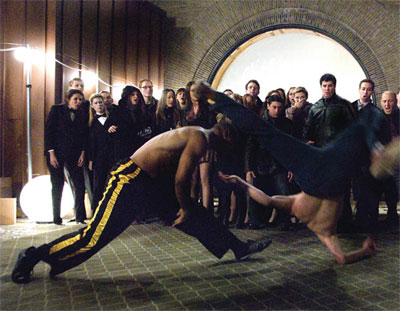 QUESTION: Do you want them to follow in your footsteps? Are they showing signs?
QUESTION: Do you want them to follow in your footsteps? Are they showing signs?TERRENCE HOWARD: Well, imy Daddy raised me as a contractor. And so for most of my life, I did construction. I'm sure because I'm in this business, the kids are naturally going to pick up pig farming. [LAUGHTER]
QUESTION: The movie Pride was very centered on you as the lead. Have you been looking for any more leading vehicles like that?
TERRENCE HOWARD: Yeah. Yeah, but I had to wait for a minute, to trust where I was going. You know, we're doing - me, Laura Ziskin, and Tom Schulman, who did Dead Poet's Society, wrote Dead Poet's Society, we're about to do a film called Morgan's Summit, where I go back into the lead. I'm about to do Macbeth, which we're producing. We're going to do that this summer. And then Chevalier and Antoinette, another film I'm producing where I'll play the -
QUESTION: Can you specifically talk about those other films? Who you're going to be playing?
TERRENCE HOWARD: Oh. With Morgan's Summit, it's really one of the most fantastic films I've ever read in my life. Tom Schulman wrote Dead Poet's Society. And he heard me on NPR and asked me to come in, and we began talking about what he wanted to accomplish. The script, the characters in the script are so, so beautiful. It's so beautiful. I mean, I'm not even going to spend the time talking about it today. But, Morgan's Summit is an incredible - it's the film that I've been waiting for. You know. And talking to some people about doing some incredible bio-pics right now.
QUESTION: About whom?
TERRENCE HOWARD: Hmmm! I learned that lesson the hard way.
QUESTION: And Macbeth?
TERRENCE HOWARD: Yeah. My production company is producing that. We're shooting in Puerto Rico starting in June.
QUESTION: Is it updated?
TERRENCE HOWARD: Yes. It's updated, present time Caribbean. Be a nice thing, to see Shakespeare under a Caribbean sun.
QUESTION: Well, I was really looking forward to seeing you continue in Iron Man. What happened with that?
TERRENCE HOWARD: Iron Man happened with that. Marvel happened with it. They made a choice. They made a very, very bad choice. They didn't keep their word. They didn't honor a contract. They sent everyone out into a field, and told them to work, and produce a great bounty. And you produce a great bounty. And then when it's all in the storehouse, you are not allowed in to the storehouse.
QUESTION: They were pulling the same crap with Samuel Jackson, too.
TERRENCE HOWARD: They did the same thing with Gwyneth. They did - from what I've been told. You know, they did it with almost everyone, I think, except Downey, throughout the thing. But one of the things that actors need to learn to do is take a tip from friends. When you - you always choose to stick together, you know? One for all, and all for one. Our gang, you know? Let Spanky be our rule, you know?
QUESTION: Does that teach you a lesson about the politics of Hollywood filmmaking?
TERRENCE HOWARD: Yeah. Make sure your T's are crossed twice.
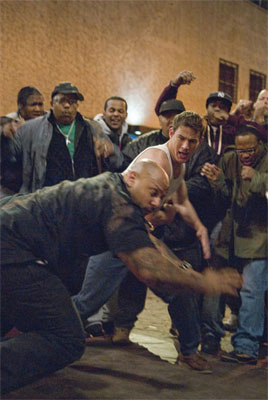 QUESTION: It seems so outrageous to me.
QUESTION: It seems so outrageous to me.TERRENCE HOWARD: But coming from human beings, it's not. You know.
QUESTION: Aren't you kind of dangerous to them, now that you know their plans for the trilogy?
TERRENCE HOWARD: No, when someone does something wrong, you don't have to get `em back, you know? Everything right will return the favor for you.
QUESTION: So, you believe in karma.
TERRENCE HOWARD: Oh, my goodness.
QUESTION: I don't want to be on your bad side.
TERRENCE HOWARD: No. I'm on the side of right. You know. So. As long as you keep trying to do what's right, and you make your mistakes along the way and accept the consequences of your mistakes, you'll keep surviving. Harvey [in Fighting] refused to accept the consequences of his mistakes. He refused to change. He refused to grow. He refused to be human. And became something less than human.
QUESTION: Until the end. Until he realized what -
TERRENCE HOWARD: I don't even think he's made that transition in the end.
QUESTION: Really?
TERRENCE HOWARD: Remember, look into his eyes.
QUESTION: Do you think that this sets itself up for a sequel?
TERRENCE HOWARD: I don't know, man. I've heard that a couple times. I would be interested in seeing what Harvey is like in the future. You know.
QUESTION: So, you would consider doing another.
TERRENCE HOWARD: I mean, I haven't delivered Harvey home yet. So, I've got - you know, you're still kind of responsible for them until they get home. You know?
QUESTION: How about music? What are you doing in the music world?
TERRENCE HOWARD: My flamenco is incredible now, for me. I'm working on my second album right now.
QUESTION: Really? Do you have a title for it? What kind of music? Will that album reflect more of who you are now?
TERRENCE HOWARD: Yeah. I mean, the first album reflected my nature. The things that I dream of. It was my backdrop. The faraway-so, you paint the big sky, and you paint the sun, and you paint the clouds and you paint the landscape and the mountains in the background. So, this one should paint a little - you know, that mid-range of me. I don't know who I am yet. So, along the way, I'll - after about three or four albums, I'll be able to predict where I am. But you can never really see where you are, you know? Because you're so busy looking at everything else. And you have to move past you to stop and take a look back. So, I don't know if it'll reflect me. But it'll reflect where I've passed.
QUESTION: Do you love all different kinds of music?
TERRENCE HOWARD: Everything.
QUESTION: And so is that another thing where you're choosing which kind of music that you want it to represent?
TERRENCE HOWARD: No. You don't choose to represent any of them, I don't believe. I think you have to - we're all antennas, you know? No thought has ever come to you that's just been indigenous of you, you know? We're - electricity is moving through us, the same way it's moving through everything else. And there's waves of activity, according to how things expand in the universe, anyway. So, that electricity is moving through that. And every once in a while, you'll be pushed up on that wave, to where you'll catch a frequency from something else. You know? And because you were in the right particular frequency yourself, you can respond to it. And maybe you'll translate it out. But if you don't translate it, what ends up happening is, you're not able to continue moving according to how everything else is moving.
QUESTION: Is music more your go-cart than acting?
TERRENCE HOWARD: Music is my go-cart.
QUESTION: What makes it more your go-cart?
TERRENCE HOWARD: Because it's all mine. It's all mine.
QUESTION: So, would you like to write something in the movie world that could be your go-cart?
TERRENCE HOWARD: I am doing that, too. You know. It's a great - a couple projects.
QUESTION: Can you elaborate? No.
TERRENCE HOWARD: No. It's not good to. It's not good. I've learned that the hard way, you know? If you speak of something, you lose it.
QUESTION: What kind of genre?
TERRENCE HOWARD: Oh. Well, the things that made me want to be an actor in the very start were films that told the story of a child's dream. You know? The regrets of an adult's past. But the hope of a grandmother's future. You know? Anything that can really take you through a continued progressive life. That's how the films will be. They'll have to have music as a base for them. Because I think music creates the fourth dimension. You have your black and your white, which - one and two. You add color, you've got your three. But music gives you depth. Music gives you a sense of time. You know? Chronological order begins where the music begins, not where the color begins. So, you need to tell a full story that way.
QUESTION: What about Broadway? Would you go back, if you found a play you really wanted to do?
TERRENCE HOWARD: As long as it's not eight shows a week.
QUESTION: Yeah, that's pretty tough.
TERRENCE HOWARD: That's - I love Broadway. But I love Terry, too. I love Terry time. And you don't have any Terry time, when you're doing Broadway. You know? Because you're always thinking about the character. You're never able to walk away from him. And then you've got to do him twice on Wednesday, and twice on Saturday. You know? You've got to rehearse with new people when somebody's stepped out of it. And you - you've got people in the front audiences looking at you. [LAUGHTER]
QUESTION: Which of the big summer movies are you looking forward to seeing?
TERRENCE HOWARD: God, I don't even know which ones are coming out. Which ones? Transformers and GI Joe. I want to see both of them.
QUESTION: Star Trek?
TERRENCE HOWARD: Star Trek, no. I don't know. I'm a Trekkie fan, too. But you don't mess around with Leonard Nimoy's person - I don't know.
QUESTION: Obviously next summer you're looking forward to Iron Man II coming out.
TERRENCE HOWARD: Yeah, I'm definitely looking forward to it. I want to see what happened with that. I want to see Don Cheadle become me.
QUESTION: He only wishes he could become you.
TERRENCE HOWARD: I want him to do better than me. That's what I really want to see. You know? And I think he can. Don Cheadle was - he's the reason I got Crash. You know, he was one of the producers on Crash. And he called and got me in there. So.
QUESTION: Oh, this is ironic, isn't it?
TERRENCE HOWARD: So it's like, Don is good by me, anything he does. He's given me the greatest gift that I could ever imagine hadding. Of hadding? Ooh, is that a new word? Hadding. Yeah. But, Don gave me that. So anything I have, I'll share with him.
QUESTION: When you mentioned you grew up with a contractor father, and your kids might go into a different business than you - how do you teach your kids a good work ethic when they grow up in all the success you have?
TERRENCE HOWARD: I mean, the work ethic was established - you know, I think we all know it. It's, what you're doing least, you're doing great. Because everything is going to follow another pattern. It's going to multiply. And you - the more complex you make a situation, the more divided nature you need to go through, to understanding it. And if you keep dividing down and dividing down and dividing down, you'll ultimately end up in negative numbers. Nobody wants to do that, you know? So, keep it simple. Keep it factorable. Make sure, whatever you do, there's a factor for it that you can get back to the beginning.
QUESTION: Is dividing between movies and music a little dangerous?
TERRENCE HOWARD: No, I multiply with that. [LAUGHTER]
Interview with Channing Tatum for Fighting - www.femail.com.au/channing-tatum-fighting-interview.htm
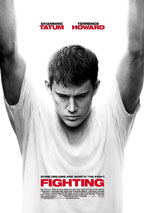
Fighting
Starring: Channing Tatum, Terrence Howard, Zulay Henao, Brian White, Luis GuzmánDirector: Dito Montiel
Genre: Action/Adventure
Runtime: 1 min 45 secs
In director Dito Montiels 2009 drama, FIGHTING, Channing Tatum (G.I. JOE: THE RISE OF COBRA) portrays Shawn, a young man from the South trying to make a living on the streets of New York City.... In director Dito Montiels 2009 drama, FIGHTING, Channing Tatum (G.I. JOE: THE RISE OF COBRA) portrays Shawn, a young man from the South trying to make a living on the streets of New York City.
When Shawn gets into an altercation while selling bootleg CDs and DVDs, a con man (Terrence Howard) who witnesses the brawl takes him under his wing and introduces Shawn to NYCs underground street-fighting circuit. In these bare-knuckle battles, Shawn has a chance to win significant money--and also the heart of the beautiful Zulay (Zulay Henao). A film that goes beyond its deceptively simple title and premise, FIGHTING is elevated by the keen eye of Montiel, who also co-wrote the script with Robert Munic, and the charismatic presence of Tatum, who previously had a minor role in the writer-directors cinematic debut, A GUIDE TO RECOGNIZING YOUR SAINTS.
Although the film goes through the standard up-by-the-bootstraps dramatic cycle, the performances of Tatum, Howard, and Henao make the story surprisingly compelling, and the fight sequences are exceptionally fierce, giving the movie considerable added zest. Though less high-profile than combat classics such as ROCKY and THE KARATE KID, FIGHTING fits well into the category of revered movies of the boxing/martial-arts subgenre.
MORE
- Viggo Mortensen The Road
- 24 Cast Reunion
- Aaron Eckhardt No Reservations
- Aaron Eckhart The Dark Knight
- Adam McKay Step Brothers Interview
- Alan Alda Diminished Capacity Interview
- Alan Alda Diminished Capacity Interview
- Alex Dimitriades
- Al Pacino Oceans 13
- Alan Rickman Snow Cake
- Alan Rickman Sweeney Todd



